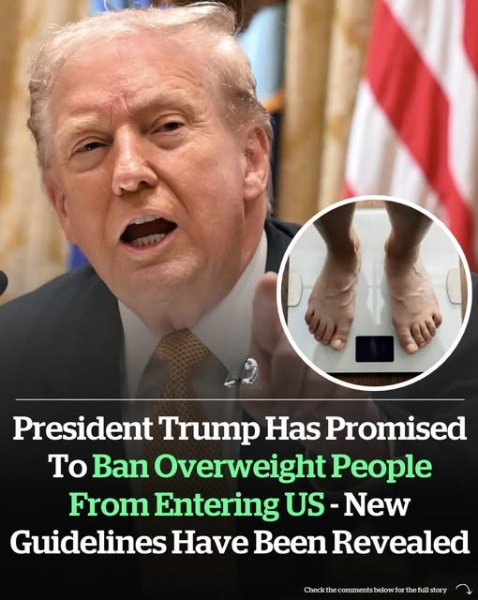People have been warned against piling on the pounds before travelling to America 😳
In a recent shift in US immigration policy, new guidelines issued by the US State Department under President Donald Trump’s administration suggest that foreigners who are considered obese may be denied entry into the country. This change stems from the government’s focus on reducing the financial burden on American taxpayers.
**Health Now a Factor in Visa Decisions**
As part of the updated visa application process, overweight applicants could face increased scrutiny, with their health potentially influencing their chances of gaining entry. Per *Fox News*, the new rules also cover a variety of health conditions beyond obesity—including cancer, diabetes, mental health issues, cardiovascular diseases, and respiratory problems.
The focus is on ensuring that immigrants do not impose an undue financial burden on the US healthcare system, with the government taking a more proactive stance in considering applicants’ health statuses.
**What Visa Officers Are Now Asking**
According to reports, a memo sent to US embassies outlined how visa officers should consider applicants’ health when reviewing eligibility. The rationale is that certain conditions could result in significant healthcare costs, potentially reaching hundreds of thousands of dollars over time.
The memo includes a question visa officers are advised to ask: **whether the applicant can cover their healthcare costs without relying on public assistance or long-term institutional care at the government’s expense.**
These new considerations are expected to impact all visa applications, though legal experts predict they will be particularly challenging for individuals seeking permanent residency.
**Legal Experts Raise Concerns**
Legal professionals have expressed concerns about the implications of these updated policies. Charles Wheeler, a lawyer with the Catholic Legal Immigration Network, pointed out that visa officers are not medical professionals and may lack the expertise to make accurate projections about applicants’ health needs.
“This could lead to biased decision-making, as officers would now be asked to consider potential future medical costs based on personal assumptions rather than professional evaluations,” Wheeler said.
The updated guidelines also call for the health status of an applicant’s family members to be taken into account, raising questions about the fairness and feasibility of using health as a key factor in immigration decisions.






Post Comment